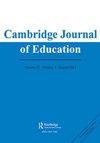高能力澳洲原住民学生对努力来源的推理
IF 1.5
3区 教育学
Q2 EDUCATION & EDUCATIONAL RESEARCH
引用次数: 0
摘要
摘要本研究调查了高能力的澳洲原住民青少年在向中学过渡的过程中,如何对努力的来源进行推理。高能力的七年级原住民青少年(n = 4)参加了三次访谈:第一学期六年级(小学);第1学期7年级(中学);七年级第四学期(过渡后)。对家长(n = 5)和工作人员(n = 20)进行1 - 2次访谈。纵向混合方法设计包括:多个案例研究的纵向分析;话语分析;频率表;以及与研究问题相关的关键主题的内容分析。结果表明,努力投入与班级平均能力相关。当被安排在平均能力水平高于他们的班级时,高能力的土著学生很难过渡到中学,被迫向上比较,对他们的学术自我概念产生不利影响。学校应该考虑同时瞄准学术技能和自我概念,并鼓励合作,以实现成功的过渡。本文章由计算机程序翻译,如有差异,请以英文原文为准。
High-ability Aboriginal Australian students’ reasoning about source of effort
ABSTRACT This study investigated how high-ability Australian Aboriginal adolescents reasoned about sources of effort in their transition to secondary schools. High-ability Year 7 Aboriginal adolescents (n = 4) participated in interviews on three occasions: Term 1 Year 6 (primary); Term 1 Year 7 (secondary); and Term 4 Year 7 (post-transition). Parents (n = 5) and staff (n = 20) were interviewed on one or two occasions. The longitudinal, mixed-methods design included: longitudinal analysis of multiple case studies; discourse analysis; frequency tables; and content analysis of key themes pertaining to the research questions. Results indicated that effort investment was associated with class-average ability. High-ability Aboriginal students found difficulty transitioning to secondary school when placed in classes where the average-ability levels were higher than theirs, forcing upward comparisons, adversely impacting their academic self-concept. Schools should consider targeting academic skills and self-concept simultaneously and encouraging cooperation to enable a successful transition.
求助全文
通过发布文献求助,成功后即可免费获取论文全文。
去求助
来源期刊

Cambridge Journal of Education
EDUCATION & EDUCATIONAL RESEARCH-
CiteScore
5.30
自引率
4.30%
发文量
35
期刊介绍:
Cambridge Journal of Education publishes original refereed articles on all aspects of education, with a particular emphasis on work that contributes to a shared understanding amongst academic researchers, theorists, practising teachers, policy-makers and educational administrators. The journal also welcomes the submission of systematic review articles that summarise and offer new insights into specific areas of educational concern. With a wide international readership, Cambridge Journal of Education publishes contributions drawn from different educational systems and cultures enabling continued in-depth discussion of global educational theory, policy and practice. The journal’s Special Issue programme encourages and stimulates focused discussion and engagement with significant themes and responses to topics raised by readers and contributors. Cambridge Journal of Education welcomes proposals for future editions.
 求助内容:
求助内容: 应助结果提醒方式:
应助结果提醒方式:


